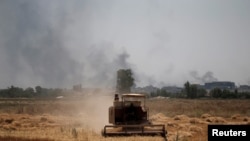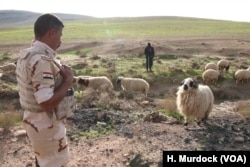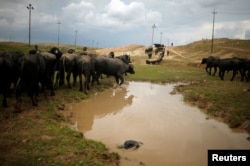Millions of people were killed or fled when Islamic State (IS) took over parts of Iraq in 2014, and their scorched-earth tactics still devastate rural communities, a report released by Amnesty International Thursday said.
Looted livestock, burned orchards, planted land mines, sabotaged water pumps and destroyed farmland have lead to the displacement of hundreds of thousands of rural households and should be viewed as a war crime, the report said.
The conflict against IS eviscerated Iraq’s agricultural production, according to the study, now 40 percent lower than in 2014, while about 75 percent of livestock was lost.
“The damage to Iraq’s countryside is as far-reaching as the urban destruction, but the consequences of the conflict on Iraq’s rural residents are being largely forgotten,” said Richard Pearshouse, senior crisis adviser at Amnesty International. “IS carried out deliberate, wanton destruction of Iraq’s rural environment.”
Devastating impact
The impact on those who have returned to deal with the destruction has been devastating, the report found.
“There is nothing left,” Majdal, a farmer from a village south of Sinjar mountain told Amnesty. “We had 100 olive trees, but when I went I didn’t see a single tree in any direction. They were chopped down and burnt. ... They didn’t want us to be able to come back to our land.”
The damage to property, including housing and land, were key factors for the protracted internal displacement of millions of Iraqis, the International Organization for Migration (IOM) Iraq Mission said.
“Hundreds of thousands of Iraqi families continue to be displaced and face significant obstacles to return,” said IOM Iraq chief of mission, Gerard Waite. “Both displaced and returnee populations are often vulnerable and need humanitarian assistance to regain their livelihoods.”
Iraq declared victory over IS last year, but there are fears the militant group is reinventing itself, according to intelligence officials who said it would adopt guerrilla tactics such as kidnappings and killings where it could no longer hold territory.
Yazidis hurt the most
The Amnesty report also noted that some of the most extensive rural damage caused by IS was felt by the minority Yazidi group in northern Iraq.
The plight of Yazidis, a religious sect, has attracted attention in recent years, especially since high-profile lawyer Amal Clooney began representing the group and Yazidi rights activist Nadia Murad won the 2018 Nobel Peace Prize.
“The whole world now knows of the monstrous violence, murders, executions, rapes, torture and kidnappings carried out by ISIS/Daesh,” said Robert Cole of AMAR International, a British charity. “What is not so well known was their wicked desire to totally destroy people’s homes, environment and vital infrastructure.”
A U.N. investigative team created by the Security Council began work in August to collect and preserve evidence of acts by IS in Iraq that may be war crimes, crimes against humanity or genocide.







